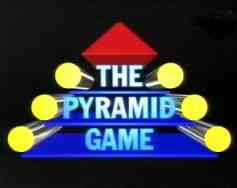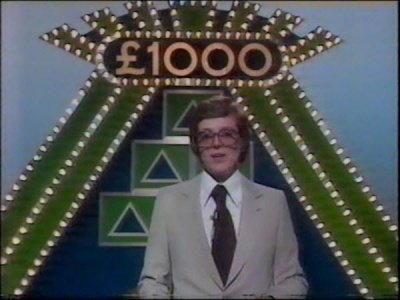The Pyramid Game
m |
(→Synopsis) |
||
| Line 36: | Line 36: | ||
In the first round, the celebrity would first pick a title which would then reveal the subject. The celebrity would then have to describe, as best as they can, to the contestant seven words connected by the subject within thirty seconds. They could use as many gestures and words as they liked but they couldn't mention anything that sounded vaguely like the word being guessed. If they did they would get a humiliating "honk" noise from the judges and they would have to move on. A little bit like ''Password'', in fact. They scored one point for every correct answer. The other team then did the same thing. Afterwards, this would be repeated but with contestant describing to celebrities and back again in round three. | In the first round, the celebrity would first pick a title which would then reveal the subject. The celebrity would then have to describe, as best as they can, to the contestant seven words connected by the subject within thirty seconds. They could use as many gestures and words as they liked but they couldn't mention anything that sounded vaguely like the word being guessed. If they did they would get a humiliating "honk" noise from the judges and they would have to move on. A little bit like ''Password'', in fact. They scored one point for every correct answer. The other team then did the same thing. Afterwards, this would be repeated but with contestant describing to celebrities and back again in round three. | ||
| - | <div class="image"> | + | <div class="image">[[Image:Pyramidgame_stevejones_early.jpg|400px]]''Steve Jones''</div> |
| - | + | ||
| - | '' | + | |
Whoever had scored the most points after round three would go through to the Winner's Circle. Here, the celebrity would have sixty seconds to convey six subjects, this time by way of lists. For example, if the subject was "Chemical Elements" they could say "Hydrogen, Oxygen" etc... until the contestant got it or they passed. Of course, the subjects were usually sillier than "Things Not to do with a Kettle" which usually appeared in earlier rounds. The first three were worth a whopping £25 each, the next two £50 and the final one a bank-breaking £100. If they won the Winner's Circle both times, the cash would be augmented to £1,000. | Whoever had scored the most points after round three would go through to the Winner's Circle. Here, the celebrity would have sixty seconds to convey six subjects, this time by way of lists. For example, if the subject was "Chemical Elements" they could say "Hydrogen, Oxygen" etc... until the contestant got it or they passed. Of course, the subjects were usually sillier than "Things Not to do with a Kettle" which usually appeared in earlier rounds. The first three were worth a whopping £25 each, the next two £50 and the final one a bank-breaking £100. If they won the Winner's Circle both times, the cash would be augmented to £1,000. | ||
Revision as of 10:50, 3 January 2009

Contents |
Host
Donny Osmond (2007)
Co-hosts
Voiceover: Robin Houston (1978-83)
Broadcast
As part of Bruce Forsyth's Big Night: 1978
As part of The Steve Jones Games Show: 1979
As standalone programme:
LWT for ITV, 5 September 1981-18 August 1984
TVS for ITV, 1989-1990
Sony for Challenge, 7 May 2007-
Synopsis
Steve Jones, when not being a voice-over to every Awards ceremony ever, occasionally could be found in his spare time hosting this. Two celebrities, of the A-and-a-half list variety, would attempt to match minds with two contestants. But not before the distinctly average synthesiser theme tune.
Taking pride of place in the middle of the studio would be a bank of six screens structured in a pyramid shape. On each one would be a title. These would usually be cryptic clues to the topic of conversation but failing that, they'd just be poor puns.
In the first round, the celebrity would first pick a title which would then reveal the subject. The celebrity would then have to describe, as best as they can, to the contestant seven words connected by the subject within thirty seconds. They could use as many gestures and words as they liked but they couldn't mention anything that sounded vaguely like the word being guessed. If they did they would get a humiliating "honk" noise from the judges and they would have to move on. A little bit like Password, in fact. They scored one point for every correct answer. The other team then did the same thing. Afterwards, this would be repeated but with contestant describing to celebrities and back again in round three.
Whoever had scored the most points after round three would go through to the Winner's Circle. Here, the celebrity would have sixty seconds to convey six subjects, this time by way of lists. For example, if the subject was "Chemical Elements" they could say "Hydrogen, Oxygen" etc... until the contestant got it or they passed. Of course, the subjects were usually sillier than "Things Not to do with a Kettle" which usually appeared in earlier rounds. The first three were worth a whopping £25 each, the next two £50 and the final one a bank-breaking £100. If they won the Winner's Circle both times, the cash would be augmented to £1,000.
The whole process was repeated after the break with contestants swapping celebs so as to give a fair crack of the whip to each contestant. The player who had won the most money that day had the dubious pleasure of doing it all again the next day. Celebrities stayed for each of the five weekdays.
In 2007 Challenge TV decided to make their own version with heart-throb to women of a certain age Donny Osmond, who had recently hosted the show in the US, a the helm. The set is more chrome-y than before but the game is pretty much unchanged. The money is a bit bigger though - the categories in the Winner's Circle now being worth £50, £75, £100, £125, £150 and £250, augmented to £1,000 if they get all six. Whatmore if they do it again in the same show they win an additional £2,000, and provided you get to the Winner's Circle twice in the same show you qualify to come back for the next one and add to the winnings.
Key moments
Behind one of the subjects each day was a 'Lucky 7' symbol, which had its own distinctly average sound motif. If they could get all seven correct within the time they'd win the "lovely" Pyramid Clock.
Inventor
Based on the American version, originally entitled The $10,000 Pyramid, created by Bob Stewart.
See also
This started out as one segment of Bruce Forsyth's big blunder, Bruce Forsyth's Big Night, then became part of The Steve Jones Games Show.


